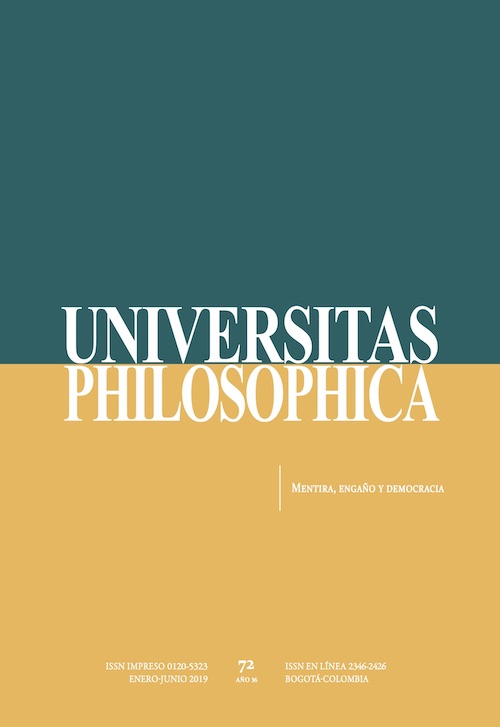Resumen
Este artículo problematiza el difundido diagnóstico sobre la relación entre política y verdad, o política y mentira, que se moviliza con el vocablo posverdad. Primero, se cuestiona la presunta novedad histórica que este pretende identificar, recordando cómo la filosofía política en Occidente ha estado atravesada por una ansiedad frente a la fuerza amenazante de un discurso huérfano y errante que circula sin conciencia y sin referente. Segundo, se indican las limitaciones del reproche en relación con la retirada de la razón y la veracidad de la política, y su falla en atender a cómo, desplazándonos del campo de la política electoral al de la técnica gubernamental, opera hoy una producción de la verdad de lo social en un discurso tecnocientífico hegemónico. Tercero, se muestra que hay una coherencia estructural entre la técnica gubernamental de la hiperverdad y el inescrupoloso interés estratégico en la realpolitik de la política electoral, coherencia anclada en las premisas ontológicas y epistémicas de la concepción moderna de lo político. Finalmente, se destaca la potencia crítica que ante este panorama nos ofrece aún el legado del posestructuralismo.
Aparicio, J. R., Jaramillo, P., & Manrique, C. (2017). Colombia y la ansiedad universal: Afectos, técnicas y saberes de la modernización. En: A. Tickner & S. Bitar (Eds.). Nuevos enfoques para el estudio de las relaciones internacionales en Colombia (pp. 167-192). Bogotá: Ediciones Uniandes.
Castro-Gómez, S. (2015). Revoluciones sin sujeto: Slavoj Žižek y su crítica al historicismo posmoderno. Ciudad de México: Akal.
De la Cadena, M. (2012). Indigenous Cosmopolitics in the Andes: Conceptual Reflections Beyond Politics. Cultural Anthropology, 25(2), 334-370.
Derrida, J. (1975). La farmacia de Platón. En: La diseminación (pp. 96-123). (Trad. J. M. Arancibia). Madrid: Editorial Fundamentos.
Escobar, A. (1995). Encountering Development. Princeton: Princeton University Press.
Foucault, M. (2006). Seguridad, territorio y población. Curso en el Collège de France de 1977-1978. (Trad. H. Pons). Buenos Aires: Fondo de Cultura Económica.
Foucault, M. (2007a). Historia de la sexualidad I: La voluntad de saber. (Trad. U. Guiñazu). México: Fondo de Cultura Económica.
Foucault, M. (2007b). El nacimiento de la biopolítica. Curso en el Collège de France de 1977-1978. (Trad. H. Pons). Buenos Aires: Fondo de Cultura Económica.
Hobbes, T. (2005). Del ciudadano y Leviatán. (Trad. E. T. Galván & M. Sánchez Sarto). Madrid: Tecnos.
Latour, B. (2007). Nunca fuimos modernos, Buenos Aires: Siglo XXI.
Marx, K. (1980). Contribución a la crítica de la economía política. Ciudad de México: Siglo XXI Editores.
Marx, K., & Engels, F. (2012). El manifiesto comunista. Madrid: Alianza Editorial.
Mbembe, A. (2011). Necropolítica. (Trad. E. Falomir). Madrid: Editorial Melusina.
Manrique, C. A. (2017). El discurso de los movimientos sociales como lugar para pensar el conflicto político. Las Torres de Lucca: International Journal of Political Philosophy, 9, 135-173.
Manrique, C. A. (2018). Derrida leyendo a Marx: lenguaje, historia y promesa. En: L. E. Gama, D. Paredes & A. Parra Ayala, Diálogos con Marx (pp. 129-165). Bogotá: Universidad Nacional de Colombia.
Nietzsche, F. (2008). Más allá del bien y del mal. (Trad. A. S. Pascual). Madrid: Alianza Editorial.
Oborne, P. (2005). The Rise of Political Lying. Sidney: Free Press.
Platón. (1998). El Fedro. En: Diálogos (pp. 393-413). (Trad. C. García Gual et al.). Madrid: Gredos.
Rancière, J. (2006). Lo inadmisible. En: Política, policía, democracia (pp. 41-58). (Trad. M. E. Tijoux). Santiago de Chile: LOM Ediciones.
Rousseau, J.-J. (2006). El contrato social o Principios del derecho político. (Trad. M. J. Villaverde). Madrid: Tecnos.
Strauss, L. (1998). What is Political Philosophy? Chicago: The University of Chicago Press.
Urrutia, M. (1991). On the Absence of Economic Populism in Colombia. En: R. Dornbusch & S. Edwards (Eds.). The Macroeconomics of Populism in Latin America (pp. 369-391). Chicago: The University of Chicago Press.
Weber, M. (1972). El político y el científico. Madrid: Alianza Editorial.
Žižek, S. (2007). El espinoso sujeto: El centro ausente de la ontología política. Buenos Aires: Paidós.
Esta revista científica se encuentra registrada bajo la licencia Creative Commons Reconocimiento 4.0 Internacional. Por lo tanto, esta obra se puede reproducir, distribuir y comunicar públicamente en formato digital, siempre que se reconozca el nombre de los autores y a la Pontificia Universidad Javeriana. Se permite citar, adaptar, transformar, autoarchivar, republicar y crear a partir del material, para cualquier finalidad (incluso comercial), siempre que se reconozca adecuadamente la autoría, se proporcione un enlace a la obra original y se indique si se han realizado cambios. La Pontificia Universidad Javeriana no retiene los derechos sobre las obras publicadas y los contenidos son responsabilidad exclusiva de los autores, quienes conservan sus derechos morales, intelectuales, de privacidad y publicidad.
El aval sobre la intervención de la obra (revisión, corrección de estilo, traducción, diagramación) y su posterior divulgación se otorga mediante una licencia de uso y no a través de una cesión de derechos, lo que representa que la revista y la Pontificia Universidad Javeriana se eximen de cualquier responsabilidad que se pueda derivar de una mala práctica ética por parte de los autores. En consecuencia de la protección brindada por la licencia de uso, la revista no se encuentra en la obligación de publicar retractaciones o modificar la información ya publicada, a no ser que la errata surja del proceso de gestión editorial. La publicación de contenidos en esta revista no representa regalías para los contribuyentes.


